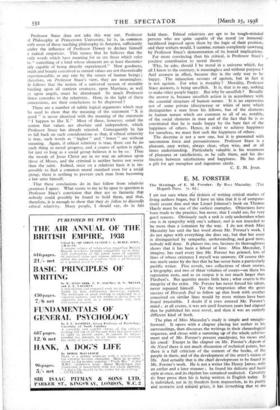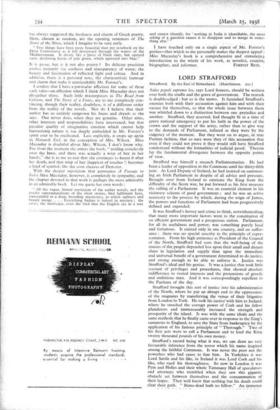E. M. FORSTER
• •
I Am not sure when the fashion of writing critical studies of living authors began, but I have an idea that it is of compara- tively recent date and that Lionel -Johnson's book on Thomas Hardy must be one of the earliest examples. Objections have been made to the practice, but never, that I could see, for very good reasons. Obviously such a task is only undertaken when one is in sympathy with one's subject, and is not intended to be more than a comment by the way. I do not think Miss Macaulay has said the last word about Mr. Forster's work, I do not agree with everything she does say, but that her essay is distinguished by sympathy, understanding, and good taste, nobody will deny. It pleases me, too, because its thoroughness shows that it has been a labour of love. Miss Macaulay, I imagine, has read every line Mr. Forster has printed, lots of lines of whose existence I myself was unaware. Of course this was made easier by the fact that he has 'never been a particularly prolific writer. Five novels, two collections of short stories, a biography, and two or three- volumes of essays—on these his reputation rests, and as an output it is not much larger than Flaubert's. But quantity means little here ; what counts is the integrity of the artist. Mr. Forster has never forced his talent, never repeated himself. Yet the temptation after the great success of Howards End to follow up that book with another conceived on similar lines would by most writers have been found irresistible. I doubt if it even entered Mr. Forster's mind ; at all events, it was not until fourteen years had elapsed that he published his next novel, and then it was an entirely different kind of book.
The plan of Miss Macaulay's study is simple and straight- forward. It opens with a chapter placing her author in his surroundings, then discusses the writings in their chronological sequence, and. closes with a summing up of the whole achieve- ment and of Mr. Forster's present standpoint, his views and his creed: Except in the chapter on Mr. Forster's Aspects of the Novel there is not much discussion of technical points, but there is a full criticism of the content of the books, of the people in them, and of the development of the artist's vision of life. And actually that is the chief development to be found in Mr. Forster's work. He is not a writer like Henry James, with an earlier and a later manner ; he found his delicate and lucid style at once, and its rhythm has remained unaltered. Certainly rio finer prose than his is being written in English today. It is individual, yet in its freedom from mannerism, in its purity and restraint and natural- grace, it his something that to me
has always suggested the freshness and charm of Greek poetry. Here, chosen at random, are the opening sentences of The Story of the Siren, which 'I irnagiiielty be very early.
" Few things have been more beautiful than my notebook on the Deist Controversy as it fell downward through the waters of the Mediterranean. It dived, like a 'piece of black slate, but opened soon, disclosing leaves of pale green, which quivered into blue."
It is prose, but is it not also poetry ? Its delicate precision evokes instantly the coolness and transparency of water, the beauty and fascination of reflected light and colour. And in addition, there is a personal note, the characteristic humour and charm that make it unmistakably Mr. Forster's.
I confess that I have a particular affection for some of these early tales—an affection which I think Miss Macaulay does not altogether share. Such little masterpieces as The Road from Colones, and The Story of a Panic, are to me completely con-
vincing, though their reality, doubtless, is of a different order from the reality of the novels. Nor do I believe that their author has so entirely outgrown his fauns and dryads as she says. One never does, when they are genuine. Other aims, other interests and responsibilities have intervened, but that peculiar quality of imaginative emotion which cannot help humanising nature is too deeply embedded in Mr. Forster's spirit ever to be eradicated. Less explicitly, it crops up again in Halyards End, in the conception of Mrs. Wilcox. Miss Macaulay is doubtful about Mrs. Wilcox, I don't know why. For from the moment she enters the book, " trailing noiselessly over the lawn, and there was actually a wisp of hay in her hands," she is to me so real that she continues to haunt it after her death, and that wisp of hay (happiest of touches !) becomes a kind of symbol, like the corn sheaves of Demeter.
With the deeper mysticism that permeates A Passage to India Miss Macaulay, however, is completely in sympathy, and the chapter devoted to that work is perhaps the most admirable in an admirable book. Let me quote her own words :
" All the vague, hinted mysticism of the earlier novels, and the cruder supernaturalisms of the short stories, fmd fulfilment here, transcended in a deep, brooding mysticness, in which ugliness and beauty merge. . . . Everything Indian is haloed in mystery ; the caves, the landscape, even the bird that the English see in a tree
and cannot identify, for ' nothing in India is identifiable, the mere asking of a question causes it to disappear and to merge in some- thing else.'
I have touched only on a single aspect of Mr. Forster's genius—that which to me personally makes the deepest appeal : Miss Macaulay's book is a comprehensive and stimulating
introduction to the whole of his work, as novelist, essayist,











































































 Previous page
Previous page